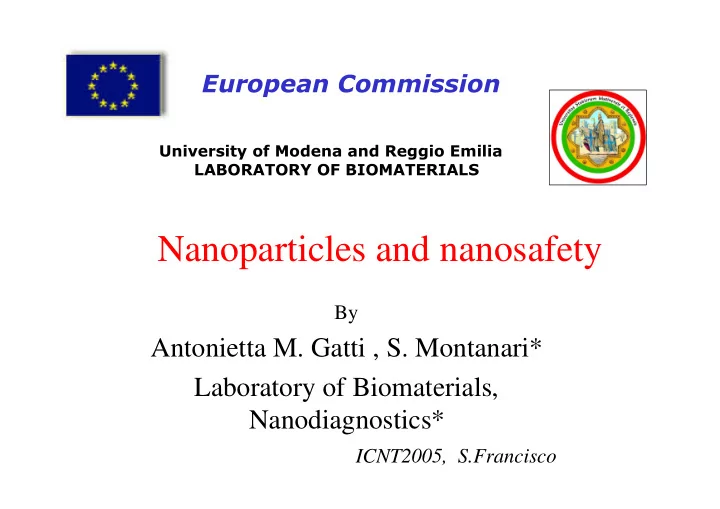

European Commission University of Modena and Reggio Emilia LABORATORY OF BIOMATERIALS Nanoparticles and nanosafety By Antonietta M. Gatti , S. Montanari* Laboratory of Biomaterials, Nanodiagnostics* ICNT2005, S.Francisco
is the branch of learning that deals with how the organism reacts to the presence of micro- and nano-particles
ESEM ESEM
Nano-toxicity of Co, Ni, SiO 2 , ZrO 2 and PVC has already been evaluated from different standpoints : In-vivo tests In-vitro tests Clinical results
Nanoparticles Sizes ranging from 40 up to 200nm • - Cobalt (Co) Metals • - Nickel (Ni) • - PVC Polymer • - Titanium Oxide (TiO 2 ) Ceramics • - Silicon Oxide (SiO 2 ) • - Zirconium Oxide (ZrO 2 )
In-vitro tests Monocyte/Macrophages U937 Gut Epithelial cells Caco-2 Liver Epithelial cells HepG2 3-dimensional angiogenesis cell coltures Univ. of Mainz, D
Macrophage Survival 120 cells living cells 100 Co % living 80 SiO 2 TiO 2 60 PVC % 40 ZrO 2 Ni 20 0 100.0 100.0 C 12.5 12.5 25.0 25.0 50.0 50.0 200.0 200.0 400.0 400.0 mg/10 6 cells mg/10 cells by Boraschi
Co nanoparticles inhibit macrophage reactivity to bacterial challenge 20 IL-1Ra (ng/10 6 cells) medium 15 Receptor expression TiO 2 60 Co IL-1Ra (Arbitrary Units ) IL-1 β 50 IL-1 β (pg/10 6 cells) 10 40 10 30 TiO 2 5 20 10 0 0 0 TLR4 CD1 4 medium TiO 2 Co medium Co TiO 2 Co nano-particles used at non-toxic concentrations by Boraschi
medium medium Co Co SiO 2 TiO 2 ZrO 2 SiO TiO ZrO 2 2 TLR2 TLR1 TLR6 TLR4 CD14 MD-2 TLR3 TLR7 TLR8 1 1 TLR5 TLR9 IL-1RI IL-1RII IL-1RAcP IL-18R α IL-18R β 0 1 0 20 30 0 10 20 30 0 10 20 30 0 0 10 10 20 20 0 30/0 30/0 10 10 10 20 20 20 30 30/0 30/0 10 10 20 20 0 30/0 30/0 10 10 10 20 20 20 30 30/0 30/0 10 10 20 20 30 30 mRNA expression expression ( (arbitrary arbitrary units units) ) mRNA by Boraschi
Conclusions Nano-particles do not affect cell survival or proliferation only Co nano-particles are toxic at >100 mg/10 6 cells Co nano-particles inhibit expression of LPS receptors TLR4 and CD14 - down-regulation of mRNA expression for TLR4 and CD14, the two receptor chains which recognise bacterial lipopolysaccharide and activate macrophage defence functions Co nano-particles impair macrophages activation by bacterial LPS - negligible cytokine production THUS: IN THE PRESENCE OF CO NANO-PARTICLES, MACROPHAGES BECOME UNABLE TO MOUNT APPROPRIATE DEFENCE TO BACTERIAL CHALLENGE DANGER OF INCREASED SUSCEPTIBILITY TO INFECTIONS
Ni Group : nodules observed on both sides (particles + bulk material) in all animals 6 months after implantation Co Group : Nodules observed on the left side (nanoparticles IM) in all cases 8 months after implantation – nothing on the right side (bulk material implanted SC)
Mechanisms of entrance of nanoparticles into the human body Respiratory system Blood circulation
Mechanisms of entrance of nanoparticles into the human body Digestive system Lymph circulation Size <20 m Polluted food
V 27-2 Cross section of a thrombus formed in vivo at low magnification with the EDS spectrum of the elements 200 m Ref efer eren ence sample mple
Pulmonary 123 TS Mesothelioma 2 m 10 m Fibers of asbestos 10 m Pearls of Iron proteinate 10 m in in kV
Nanoparticles of a Lead 20 E compound in the lung. The patient was affected by a multiorgan granulomatosis A. A.U. 10 m kV
Gastric adenocarcinoma Stomach biopsy Zr O Zr 7
DC 3 Cancerogenic tissue of the colon with aggregates of nanoparticles of Silver-Magnesium A. A.U. kV
IT 4 c Cancerogenic tissue of colon with an aggregate of particles of Silver-Molibdenum A. A.U. kV
Nanoparticles of Gold in a liver granuloma. The patient was treated with colloidal gold particles for knee arthrosis
AP 6 Liver affected by cryoptogenic granuloma with micro debris of calcium-sulphate and clusters of nanoparticles of a silicate
Nanoparticles in a soldier’s kidney affected by the Gulf-War Syndrome Cluster of nano Hg-Se Hg Se
Cluster of nanoparticles of a Lead compound found in a lymph node in a non- Hodgkin lymphoma
175 BH Section of a lymph- node in a civilian of Sarajevo affected by Hodgkin Disease (FEG-Quanta ) 5 m
BLOOD Soldier’s wife affected by Burning Semen disease Red cells 292
99 GW 10 m Bladder cancer with Cobalt & Tungsten 2 m
Cancerogenic liver tissue with nanoparticles of Titanium inside a cell nucleous
Liver cancer Fe
Malformed lamb born inside a groundfire in Sardinia, 2003
Internal organs of the 291CA malformaed foetus Live ver Brain Test sticl cle
ESEM analysis of an alive spermatozoon inside the plasma spermatozoon Nanoparticle of Lead 20 m
Particle of Antimony- Cobalt found in a soldier’s sperm
After an experience of 400 cases of human cancer analyzed we can state: Can nanoparticles have a pathological meaning to the human health ? Evidence says: YES Are the normal cell defence reactions still valid? Evidence says: NO What is the interaction nanodust/organism (humans, animals, bacteria, proteins, viruses)? ????
Environmental pollution pollution Environmental Industrial pollution Food Food
The ability to think differently today from ability to think differently today from The yesterday distinguishes the the wise wise man man yesterday distinguishes from the the stubborn stubborn. . from J.Steinbeck Steinbeck ( (Nober Prize Nober Prize 1962) 1962) J.
Recommend
More recommend